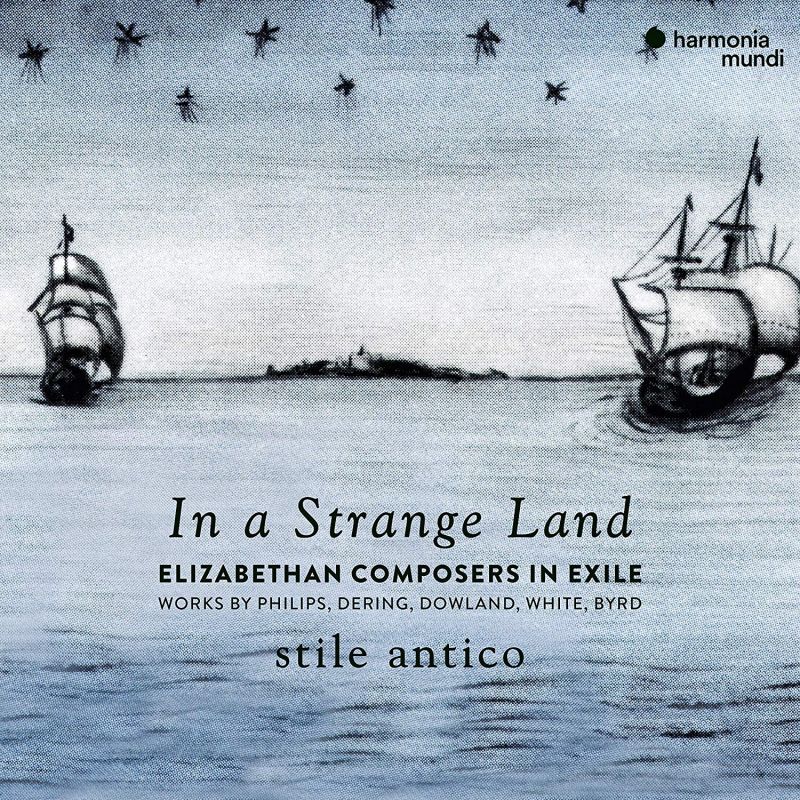In a Strange Land: Elizabethan Composers in Exile
View record and artist detailsRecord and Artist Details
Composer or Director: Huw Watkins, John Dowland, Peter Philips, Philippus de Monte, Robert White, William Byrd, Richard Dering
Genre:
Vocal
Label: Harmonia Mundi
Magazine Review Date: 01/2019
Media Format: CD or Download
Media Runtime: 72
Mastering:
DDD
Catalogue Number: HMM90 2266

Tracks:
| Composition | Artist Credit |
|---|---|
| Quomodo cantabimus? |
William Byrd, Composer
stile antico William Byrd, Composer |
| Tristitia et anxietas |
William Byrd, Composer
stile antico William Byrd, Composer |
| Factum est silentium |
Richard Dering, Composer
Richard Dering, Composer stile antico |
| Flow my Teares, 'Second Book of Ayres' No 2 |
John Dowland, Composer
John Dowland, Composer |
| In this trembling shadow |
John Dowland, Composer
John Dowland, Composer stile antico |
| Super flumina Babylonis |
Philippus de Monte, Composer
Philippus de Monte, Composer |
| Gaude Maria virgo |
Peter Philips, Composer
Peter Philips, Composer stile antico |
| Regina coeli |
Peter Philips, Composer
Peter Philips, Composer stile antico |
| The Phoenix and the Turtle |
Huw Watkins, Composer
Huw Watkins, Composer stile antico |
| Lamentations (5vv) |
Robert White, Composer
Robert White, Composer |
Author: Edward Breen
Dowland’s famous pavane Flow my tears opens the album, performed as a part-song rather than the more familiar lute-song beloved of countertenors. Stile Antico, as ever, excel in plangency, singing slowly with two voices per part and leaning into the famous descending ‘lachrimae’ motif. It’s beautiful, but ponderous compared to Dowland’s more madrigalian In this trembling shadow a few tracks later. Here the initial use of single voices per part brings immediacy and intimacy, which serves the chromaticism with poignancy. Dowland’s penchant for melancholy is infamous but in the hands of Byrd it is strikingly political. In Tristitia et anxietas Stile Antico find a slow burn of sorrow in Byrd’s churning harmonies and focus on rich, low sonorities, allowing for a lightening of interpretation in the more hopeful second half.
Old Testament texts concerning the Babylonian or Egyptian captivity often indicated Catholic sympathies, as did the metaphorical use of ‘Jerusalem’ to pray for ‘England’. That Byrd survived making such overt references is testament to the esteem in which he was held by Elizabeth I. In an exchange of motets with his Flemish contemporary Philippe de Monte drawing on Psalm 136, de Monte asks ‘How shall we sing the Lord’s song in a strange land?’ (Super flumina Babylonis). To which Byrd responds, ‘If I forget thee, O Jerusalem, let my right hand forget her cunning’ (Quomodo cantabimus). Stile Antico’s interpretation of de Monte’s motet is gently questioning yet I prefer a firmer tracing of the shapely depictions of harps hanging abandoned on the willows. Their sound is meltingly gorgeous but I maintain a preference for the gritty passion of The Cardinall’s Musick under Andrew Carwood (ASV, A/99). Similarly with Byrd’s hopeful reply: Stile Antico allow the texture to unfold with a gentle flow in what is some superb singing but I long for a more treble-dominated balance for such pointed texts. They find this in Huw Watkins’s setting of Shakespeare, The Phoenix and the Turtle. Here, especially towards the end, they employ the sort of energy I would love to hear them bring to Byrd.
Discover the world's largest classical music catalogue with Presto Music.

Gramophone Digital Club
- Digital Edition
- Digital Archive
- Reviews Database
- Full website access
From £8.75 / month
Subscribe
Gramophone Full Club
- Print Edition
- Digital Edition
- Digital Archive
- Reviews Database
- Full website access
From £11.00 / month
Subscribe
If you are a library, university or other organisation that would be interested in an institutional subscription to Gramophone please click here for further information.




